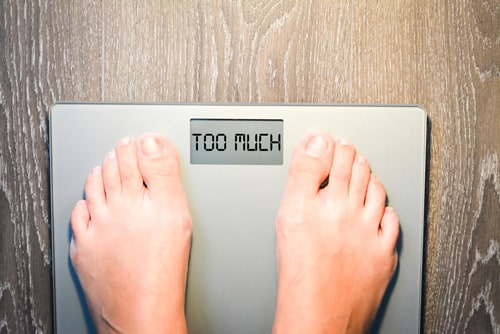We climb on the bathroom scale, look at our weight, and climb off. Then we either smile or mutter to ourselves, “I need to lose a few pounds.”
This common ritual is completely misguided, say metabolic researchers at Harvard University. Your scale can’t tell if you’re at a healthy weight.1
Dr. Christos Mantzoros is a professor of medicine at Harvard-affiliated Beth Israel Deaconess Medical Center in Boston. He says if you’re worried about being fat, you should forget the scale.
It’s not the number looking back at you from the scale that matters. It’s where that weight is located.
Fat: It’s All About Location, Location, Location
Some people are genetically predisposed to having more fat tissue under their skin, he explains. This means they are heavier, but that’s not necessarily a bad thing. This “subcutaneous” fat is stored in a healthy place.
Other people may look leaner because they have fewer fat cells under their skin. But this can mean they have an unhealthy fat accumulation elsewhere, Dr. Mantzoros said.2
When fat isn’t being stored beneath the skin, it can end up in and around the liver and other organs. This is far worse for you than subcutaneous fat.
“Visceral” or belly fat is associated with diabetes, high cholesterol, high blood pressure, inflammation, and heart disease.
So two people of the same height can weigh the same, but if their weight is distributed differently, their health outlook can be dramatically different, Dr. Mantzoros said.
Should You Track Your BMI?
Some doctors recommend body mass index (BMI) measurements to get a more accurate picture of health. BMI is a ratio of a person’s weight to the square of their height.3
But a UCLA study recently found that millions of people considered overweight or obese by the BMI are perfectly healthy.
The researchers looked at the BMIs of 40,000 American adults. They compared the subjects’ BMI readings to their cardiometabolic health. This includes risk of heart disease and diabetes. It also includes data on blood pressure, blood sugar, inflammation, cholesterol, and insulin levels. In other words, cardiometabolic health is a detailed barometer of overall health.
They found that almost half the people considered overweight by the BMI were in good health. And conversely, 30% of the people with a normal BMI were cardiometabolically unhealthy.
The problem with BMI is that it’s a simple ratio of height and weight. It weighs fat and muscle the same way. A muscular athlete can have the same BMI as an overweight couch potato.
But top mainstream health authorities such as the U.S. Centers for Disease Control and the National Institutes of Health continue to recommend the BMI… Despite the fact it is deeply flawed.4
The Best Way to Tell If You’re at a Healthy Weight
A British study of 300,000 people found there is one simple, accurate predictor of whether you’re at a healthy weight: Your waist size.
The researchers found that belly fat affects vital organs like the heart, liver, and kidneys more than fat elsewhere. Fat buildup in your core makes organs work harder.5
Belly fat also disrupts your hormone balance. This puts you at greater risk for hormonally related cancers such as breast, prostate, and ovarian cancers.
It’s simple to determine if your weight is healthy. Your waist circumference should be half your height or less.6
So a 6-foot man should have a waist size of 36 inches or less. A 5-foot-4 woman’s waist should not exceed 32 inches.
To measure waist circumference accurately, measure it mid-way between the lower rib and the top of the pelvic bone at the hip.7
Editor’s Note: What’s the secret to lasting weight loss? Here’s a hint: It starts—and ends—in your brain. But it has NOTHING to do with willpower…
Get all the details HERE.
Like this Article? Forward this article here or Share on Facebook.
References:
1 https://www.health.harvard.edu/heart-health/overweight-vs-overfat-is-your-scale-lying-to-you?utm_source=delivra&utm_medium=email&utm_campaign=WR20171110-WeighLess&utm_id=701695&dlv-ga-memberid=28035839&mid=28035839&ml=701695
2 https://www.health.harvard.edu/heart-health/overweight-vs-overfat-is-your-scale-lying-to-you?utm_source=delivra&utm_medium=email&utm_campaign=WR20171110-WeighLess&utm_id=701695&dlv-ga-memberid=28035839&mid=28035839&ml=701695
3 https://en.wikipedia.org/wiki/Body_mass_index
4 https://www.institutefornaturalhealing.com/2016/02/bmi-is-worthless-heres-a-better-way-to-tell-if-youre-too-heavy/
5 https://www.institutefornaturalhealing.com/2015/02/five-ways-belly-fat-is-killing-you/
6 https://www.institutefornaturalhealing.com/2016/02/bmi-is-worthless-heres-a-better-way-to-tell-if-youre-too-heavy/
7 https://www.medicalnewstoday.com/articles/245328.php

